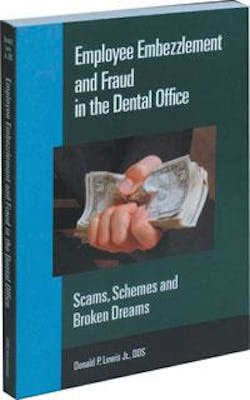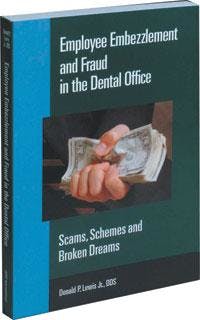Employee Embezzlement
Embezzlement in the office is a rapidly growing problem each year. Countless stories have been told of dentists being victims of embezzlement and finding out too late. Dr. Donald P. Lewis is an oral surgeon with 25 years of private practice experience and the only dentist who is also a certified fraud examiner. He discovered embezzlement in his own office and spent many months trying to recover his money. With first-hand knowledge, he used his experiences to publish a book specifically addressing embezzlement in the dental office so he could help others.
“Employee Embezzlement and Fraud in the Dental Office” ($69.95, www.lexi.com) discusses the need to have appropriate employment applications, background checks, drug testing, credit checks, and telephone interviews with references. During hiring, candidates should be asked to explain gaps in their employment history and frequent job changes. The job application should have consent statements giving permission for employment checks.
Many dentists unknowingly give up control of their office to a manager so they can concentrate on dentistry. However, one person completely responsible for the finances prevents monitoring of the accounts. Dr. Lewis states that there are specific red flags in the office to monitor, including “employee lifestyle changes, photocopies of original documents, excessive adjustments to accounts, excessive cash transactions, and unusual deposit patterns.” To reduce fraud in the office, he provides specific tips such as sending insurance checks to your home rather than the office, maintaining accurate bank statements, and proper purchasing control of office supplies. Dr. Lewis also discusses steps to be taken after discovering embezzlement and typical scams that occur in the dental office.
“Employee Embezzlement and Fraud in the Dental Office” also emphasizes diversification of office responsibilities for each employee. Some dentists advocate having the office open 12 hours, with employees working six-hour shifts so that one job is divided between two people. Not only would this increase productivity and reduce employee fatigue, it would allow financial duties to be divided between two people, thus reducing embezzlement. Cross-training employees is also important to maintain internal controls so that one job is completed by different people in the office.
This book should be extremely empowering for any dentist interested in preventing white-collar crime in the dental office; it is definitely worth its price. The 256-page book provides enough detail for every practice to easily implement the safeguards he describes. Not only will dentists receive respect from their employees for having an effective system in place against embezzlement, but patients will also benefit from an organized practice. ■
Chithra Durgam, DDS
Dr. Durgam is in private practice in Cliffside Park, N.J. She also serves as an attending doctor at Lutheran Medical Center and was formerly a faculty member at New York University College of Dentistry. She is a member of the Academy of General Dentistry, American Dental Association, New Jersey State Dental Association, Bergen County Dental Society, and American Board of Family Dentistry. Contact her at [email protected].

